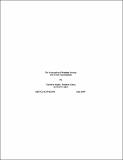The economics of rotating savings and credit associations
Author(s)
Besley, Timothy; Coate, Stephen; Loury, Glenn C.
Download28596085.pdf (3.541Mb)
Metadata
Show full item recordAbstract
This paper examines the role and performance of an institution for allocating savings which is observed world wide - rotating savings and credit associations. We develop a general equilibrium model of an economy with an indivisible durable consumption good and compare and contrast these informal institutions with credit markets and autarkic saving in terms of the properties of their allocations and the expected utility which they obtain. We also characterize Pareto efficient and expected utility maximizing allocations for our economy, which serve as useful benchmarks for the analysis. Among our results is the striking finding that rotating savings and credit associations which allocate funds randomly may sometimes yield a higher level of expected utility to prospective participants than would a perfect credit market.
Date issued
1990Publisher
MIT Center for Energy and Environmental Policy Research
Other identifiers
90-014
Series/Report no.
Working paper (Massachusetts Institute of Technology. Center for Energy Policy Research) ; MIT-CEPR 90-014.